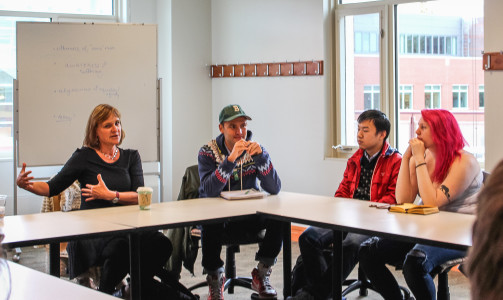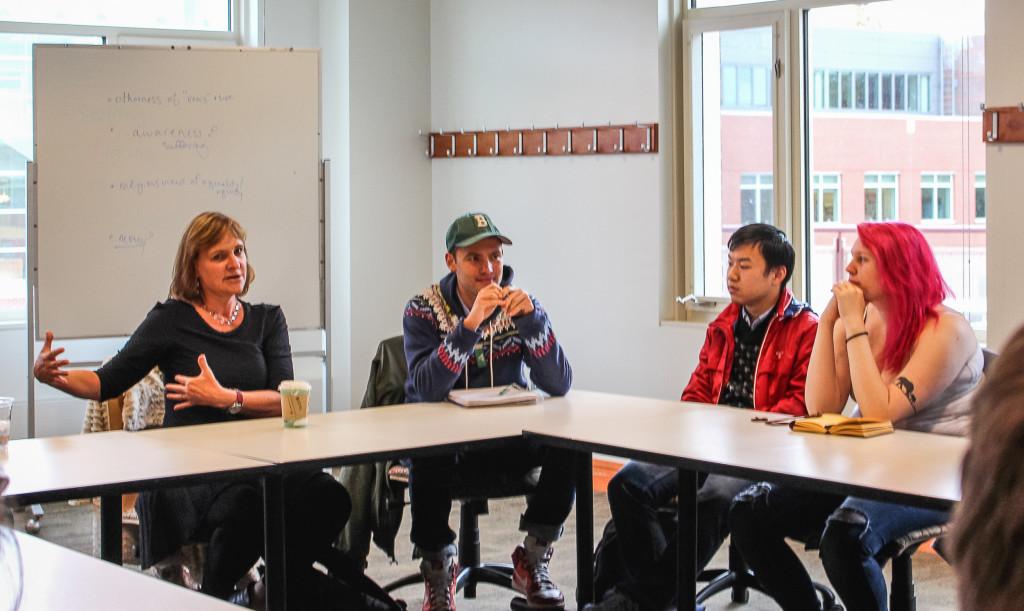Mithila Iyer
iyermith@grinnell.edu
Acclaimed novelist and short story writer Antonya Nelson gave a reading as part of the Writers@Grinnell series, reading from her new collection of short stories, “Funny Once.” The S&B’s Mithila Iyer sat down with the author to discuss her craft.

The S&B: What attracts you to the form of the short story?
I think that the form permits you to focus on a small moment that can be very powerful and might get lost in a larger narrative, like a novel. Basically a small moment that might occur that makes a pivotal change in a character’s life—not necessarily a dramatic one, just an important one, and the story form can showcase that.
You mentioned in your round table earlier today that a way you help your students improve their writing is by making them write anecdotes from personal experience that later turn into short stories. Why?
I think that investment on the part of the writer needs to be personal, but not necessarily be completely non-fictional. Something that’s happened, either to the student or to a family member, or to somebody that they know, that they realize is story-worthy can be used as a kind of template. It can become a story that they improve upon, write up fictionally because they understand it has some sort of staying power with them. It matters to them.
How do you know when something is important enough to you to write a story about?
This actually kind of ties in with what I get them to do with their anecdotes—just tell me something interesting. Just tell me—don’t write it. Just tell me the interesting thing that happened in your life, that you know will just interest me sitting here listening to it. That’s the same way I get inspired, and I was trying very hard to make my students writing process truer to my own, not to be dictatorial, but just to be more honest about the process—that it comes out of your experience and what obsesses you and then you have to turn it into fiction.
Could you speak a little bit about what your writing process is like?
Mostly an idea just forms and becomes something I’m interested in and obsessed by, and eventually I just sit down and start writing and attend to it until I’m done with it. It’s not like I write everyday, it’s when I have enough of a sense of a story that I sit down and start composing it and putting it to paper—I take a lot of notes!
How do you know when a story you’re working on is finished?
Sometimes I have a feel for how a story ends and the trouble is how to begin it! And other times I get a little lost knowing what the ending ought to be and mostly I just have to be patient and revise or think about it, or have somebody else read it and offer advice and comment on what’s working and not working. It’s a slow process and really just like puzzle solving. I just have to stare at it and think about it long enough for it to become clear to me what to do next, it’s a little mysterious.
A lot of your characters seem to fit a particular archetype, but even in this case, they display characteristics of tropes that aren’t commonly associated with their own. What do you have to say about this?
I really want characters to be distinct and individual, not to conform to stereotype. So, surprising the reader with not necessarily the contradictory qualities, but those qualities that brew in some people the expectation you have of one kind of behavior sometimes gets complicated by some other trait. For me, I’m mostly interested in making the character seem as though they’re real people and that comes with some interesting contradictions in their character.
























































